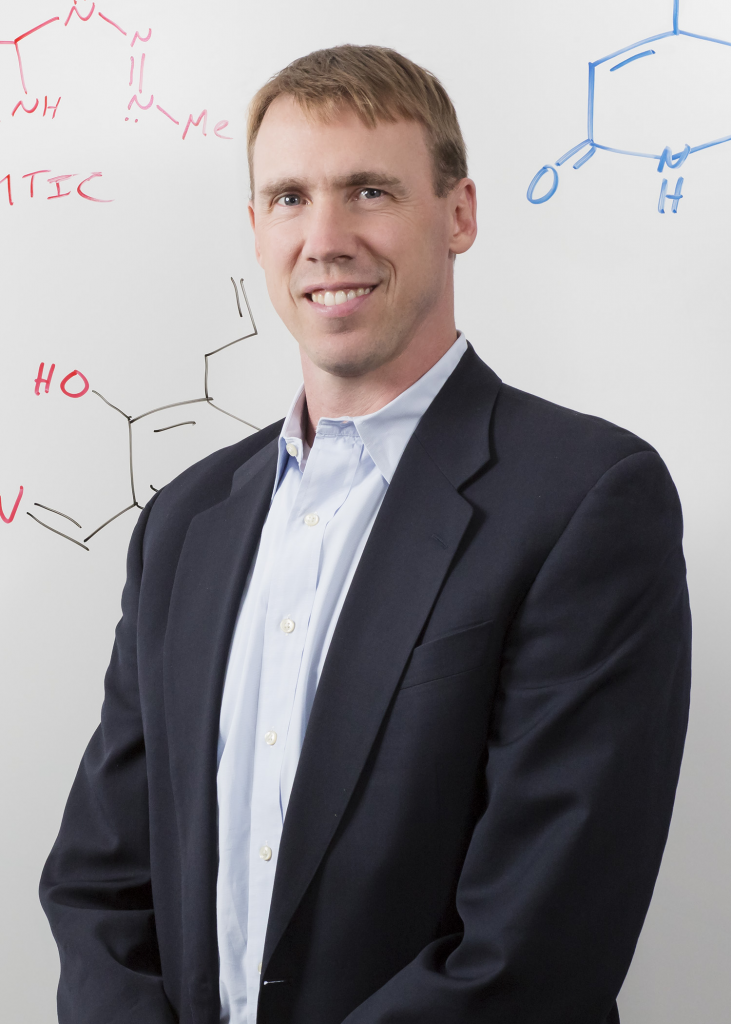
Paul J Hergenrother
261 Roger Adams Lab
Paul J. Hergenrother was born in 1972 and raised in Akron, Ohio. He attended the University of Notre Dame, where he received his B.S. in Chemistry in 1994. From there Paul moved to the University of Texas at Austin to conduct graduate research under the direction of Professor Stephen F. Martin. While in the Martin laboratory, Paul elucidated the catalytic mechanism of phospholipase C and completed the total synthesis of erythromycin B. He graduated with his PhD in Chemistry in 1999, and moved on as an American Cancer Society postdoctoral fellow to Harvard University, where he worked in the laboratory of Professor Stuart L. Schreiber in the Department of Chemistry and Chemical Biology. While at Harvard Paul was involved in the development of small molecule microarrays as a platform for high-throughput compound screening.
He established his own laboratory in the Department of Chemistry (and as an affiliate in the Department of Biochemistry) at the University of Illinois at Urbana-Champaign in 2001. He was promoted to associate professor with tenure in 2006, to full professor in 2010, and in 2013 was named the Kenneth L. Rinehart Endowed Chair in Natural Products Chemistry. Professor Hergenrother is the co-founder and Chief Scientific Officer of Vanquish Oncology, and through Vanquish an anticancer compound discovered by the Hergenrother lab (the procaspase-3 activator PAC-1) completed a Phase 1 clinical trial in late-stage cancer patients, and has also been assessed in Phase 1b/2 trials in glioblastoma and metastatic uveal melanoma. The Hergenrother lab also discovered the NQO1 substrate and anticancer compound IB-DNQ, which is scheduled for a Phase 1 clinical trial in the next 12 months. The Hergenrother lab, in collaboration with the laboratory of Prof David Shapiro (UIUC Biochemistry), also discovered the anticancer compound ErSO, with potent activity against ER+ breast tumors; ErSO was licensed to Systems Oncology who subsequently licensed it to Bayer in a ~$370M deal plus downstream royalties. More recently, next-generation ErSO derivatives were licensed to Oncoteq.
In spring of 2020, while UIUC was shut down due to the COVID-19 pandemic, Prof. Hergenrother led the team that developed a novel saliva-based assay for SARS-CoV-2, a simple protocol that bypasses the need for RNA isolation and as such is inexpensive, returns rapid results, and can be used on scale. The University of Illinois administered over 1,000,000 of these tests on its campus during Fall 2020, typically testing ~10,000 people a day, and this testing has been key to controlling the pandemic at the University of Illinois and enabling in-person classes and research, keeping positivity rates low. With Emergency Use Authorization (EUA) status, over 120 colleges, universities, schools, and businesses used this test. The ability of this saliva test to identify individuals in the early stage of infection is credited with preventing the spread of COVID-19 in many settings, including the UIUC athletic department and Illinois state legislature, and this test was widely used throughout the state, country and world.
Professor Hergenrother has been the recipient of an NSF-CAREER Award, a Research Corporation Research Innovation Award, a Beckman Young Investigator Award, an Alfred P. Sloan Foundation Fellowship, the GlaxoSmithKline Chemistry Scholar Award, the ACS David Robertson Award for Excellence in Medicinal Chemistry, the Camille Dreyfus Teacher-Scholar Award, the ACS Eli Lilly Award in Biological Chemistry, was named as an American Cancer Society Research Scholar, was named by Technology Review magazine as one of the top innovators under the age of 35, and was the recipient of the 2016 Innovation Transfer Award from the University of Illinois. More recently he was named as the recipient of the 2016 UCB-Ehrlich Award for Excellence in Medicinal Chemistry, of the 2016 Akron Section Award from the ACS, a 2017 ACS Arthur C. Cope Scholar Award, and the 2018 ACS Sosnovsky Award for Cancer Research. He was named as a Fellow of the National Academy of Inventors, and in 2023 he received the Outstanding Investigator Award from the National Cancer Institute.
At the University of Illinois Professor Hergenrother is the Leader of the IGB Theme “Anticancer Discovery from Pets to People”, is the Director of the NIH Chemistry-Biology Interface Training Grant, and is Deputy Director of the Cancer Center at Illinois. Professor Hergenrother has served or serves on the editorial board/editorial advisory board for multiple journals, including ACS Central Science, Current Opinion in Chemical Biology, Journal of Medicinal Chemistry, Organic Reactions, and ChemBioChem. The Hergenrother laboratory seeks to use small molecules to identify and validate novel targets for the treatment of intractable diseases, including cancer and multi-drug resistant bacteria.